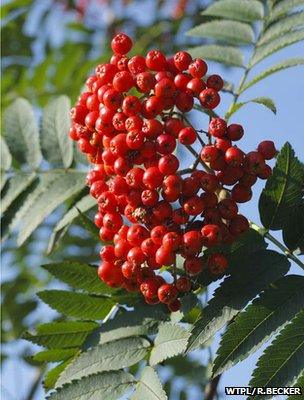UK trees' fruit ripening '18 days earlier'
- Published

The exact cause for why the fruiting season has advanced so much remains unknown
Britain's native trees are producing ripe fruit, on average, 18 days earlier than a decade ago, probably as a result of climatic shifts, a study reveals.
It shows that acorns are ripening 13 days earlier, while rowan berries are ready to eat nearly a month earlier.
Experts warn that one consequence could be that animals' food reserves would become depleted earlier in the winter.
The findings were published by Nature's Calendar, external, a data collection network co-ordinated by the Woodland Trust.
"Some of the changes are really quite big and quite surprising," explained Tim Sparks, the trust's nature adviser.
"This caused me to go back and look at the data again to make sure it was valid because even I did not believe it initially."
Prof Sparks said Nature's Calendar, formerly known as the UK Phenology Network, was established in 1998 to collect spring-time information.
"But the gap in data was in the autumn So, since about 2000, the scheme has also been collecting data on things such as fruit ripening dates, leaf colour change and fall dates, and the last birds seen," he told BBC News.
"We now have 10 years worth of data that can look at and identify changes.
"In terms of looking at the fruit-ripening dates and the thing that came out was that they all seem to have steadily advanced over the past decade."
Disruption concerns
Prof Sparks, from Coventry University, observed: "Rowan was the big one as it seemed to have advanced by nearly a month over the course of a decade."
He added that it was still uncertain what the ecological consequences of the advances would mean.
"Anything that changes out of synchronicity is likely to cause disruption," he said.
"What the actual consequences will be is slightly harder to work out. In this particular case, if all of this fruit is ripe earlier, and if all the mammals and birds are eating it earlier, what are they going to be feeding on during the rest of the winter?
"In terms of feeding birds, you have big flocks of thrushes coming down from Scandinavia and feeding on berry crops in Britain, and they tend to do that after they have exhausted the supply of berries in Scandinavia.
"You get these periods when hedges are being stripped bare, but the birds are going to have to do that earlier because that is when the fruit is ripe."
Although phenological records have shown that the arrival of spring is also advancing, Prof Sparks said it was "still a bit of a mystery" why the ripe-fruit dates had advanced over the past decade.
He suggested: "There is a very strong correlation between these ripening dates and April temperatures, and that might be a result of flowering dates - it might just be that warmer springs result in earlier flowering dates, and subsequently result in earlier ripening.
"But it might be a result of more sunshine; longer, warmer summers and therefore earlier ripening.
"So the exact mechanisms really are still a bit of a mystery. We know it is happening, but we are uncertain why."
Nature's Calendar is a web-based observations network and is a partnership between the Woodland Trust and the Centre for Ecology and Hydrology.
To date, it has more than 60,000 registered recorders across the UK that observe signs of seasonal changes in the natural environment.
The trust is calling on the public to plant a million native trees in gardens as part of its "Jubilee Woods" project.
A spokesman said that the scheme would increase the abundance of food sources for birds and animals in future years.
- Published22 September 2010